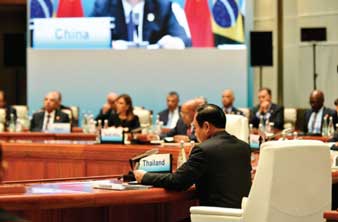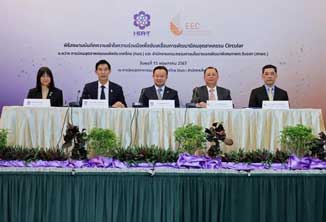Country Focus: Thailand's strategic move to rise as a bioplastics hub
From an emerging economy, Thailand is now striving to claim global economic prominence through its commitment to the bioplastics sector and a circular economy as well as the fostering of sustainable partnerships, says Angelica Buan in this report.
Thailand to contribute to regional growth
Economic prospects have fallen short of expectations, with slower-than-anticipated growth. The latest World Bank global economic report estimates global growth will stay at 2.6% in 2024 and 2025, rising slightly to 2.7% in 2025-26, despite geopolitical tensions and high interest rates.
Meanwhile, regional growth in Asia is projected to decline to 4.8% in 2024, as China's slowdown offsets faster growth in other large economies.
Regional trading partnerships and transformational government policies, particularly in emerging markets and middle-income economies like Thailand, could, however, support growth.
Taking strides with trading blocs integration
Thailand, with GDP growth projected at 2.6% in 2024 and 3% in 2025 by the Asian Development Bank's Asian Development Outlook (ADB-ADO) 2024, remains a significant pillar of the ASEAN bloc, which had a GDP of about US$3.6 trillion in 2022, making it the third-largest economy in Asia and the fifth-largest globally.
Meanwhile, Thailand is ambitiously aiming to join BRICS, a partnership founded by Brazil, Russia, India, China, and South Africa. As of 2024, Egypt, Ethiopia, Iran, and the United Arab Emirates have joined BRICS, with Thailand reportedly following suit, to advance its national interests and strengthen its strategic position in global politics.
According to Kungsri Research’s Thailand Industry Outlook for 2024-2026, Thai goods have become more competitive globally through participation in trade blocs and bilateral and multilateral free trade agreements (FTAs). Thailand is engaged in 14 FTAs with 18 countries, including the Regional Comprehensive Economic Partnership (RCEP), which bolsters its trade relationship with China.
A robust plastics manufacturing sector: Thailand's ccompetitive edge

Thailand's vibrant manufacturing sectors and diverse industries make it a natural fit for participation in global trade organisations. As a key player in sectors such as automotive, electronics, and agriculture, which rely on plastics, Thailand has established itself as a competitive economic force.
Krungsri Research anticipates global demand for plastic products to grow by 2-3% annually from 2024 to 2026. The report highlights that packaging, electrical appliances, automotive parts, construction materials, and medical devices will constitute nearly 80% of the total sales value of plastic products. It also forecasts that domestic demand for plastic products will increase by 2-3% per year, with exports rising at a similar rate.
The upward trend is corroborated by GII Research’s Plastic Market in Thailand 2024-2028 report, forecasting Thailand’s plastic market to reach nearly US$11 billion from 2023 to 2028, growing at a CAGR of 5.18% during the forecast period.
One of the key drivers supporting the country’s plastic market growth is the increasing demand for packaging materials, medical devices, automotive, electronics, consumer goods, and other plastic products.
Economic model for bioplastics
Additionally, advancements in plastic technology have led to the development of bioplastics, which align with current sustainability trends. Thailand has emerged as a global leader in bioplastic production, ranking second worldwide after the US.
Leveraging abundant raw materials like sugarcane and tapioca, Thailand currently produces 95,000 tonnes/year of bioplastic and plans to boost this capacity by an additional 75,000 tonnes/year. This surge in production not only enhances the value of Thailand's agricultural sector but also significantly reduces carbon dioxide emissions, offering a sustainable alternative to traditional plastics
With up to 90% of Thailand’s bioplastic output exported, the country has a pivotal role in the global market. Domestically, bioplastics are replacing conventional plastics, conforming with Thailand’s bio-circular-green (BCG) economy model.
Thailand, concurrently, has achieved significant success in curbing the use of single-use plastic bags. A report from the Pollution Control Department reveals a 43% reduction, equivalent to 148,000 tonnes, over three years, attributed to strategic government policies that advocate for the transition to eco-friendly alternatives to achieve 100% plastic waste recycling by 2027.
As well, public participation has been crucial in Thailand’s drive towards sustainability. Campaigns such as “Everyday Say No to Plastic Bags” have garnered widespread support across communities, shopping centres, and convenience stores. From 2020 to 2022, this campaign alone prevented the use of over 14 billion single-use plastic bags, amounting to 81,531 tonnes of plastic waste reduction.
Striking a balance with high packaging demand and sustainability
In Thailand's plastics market, the primary challenges lie in managing plastic waste and curbing environmental pollution. The extensive use of plastics has resulted in substantial generation of plastic waste, posing significant threats to ecosystems, marine life, and human health.
Addressing these issues needs the implementation of effective recycling and waste management systems, as well as initiatives to reduce single-use plastics and promote sustainable alternatives.
Plastic bags and bottles dominate Thailand's plastic packaging waste, together constituting approximately 60% of total packaging waste. Despite the higher volume of plastic bag waste compared to bottles, very few bags are collected for recycling due to their lightweight nature and contamination issues.
The 2020 report by WWF Thailand and Dutch sustainability consulting firm, Metabolic, highlighted the potential for improving recycling rates through household waste separation. The report also underscored Thailand's struggle with inadequate waste infrastructure, notwithstanding that collection and contamination have been challenging.
Alliances for a circular economy

Nevertheless, Thailand is actively pursuing strategies. Apart from its agenda to ban plastic waste imports by 2025, Thailand is also actively advancing its circular economy through initiatives like the development of its first Circular Industrial Estate, underlining efficient resource utilisation, recycling, and sustainable practices to enhance global competitiveness.
In view of this development, the Industrial Estate Authority of Thailand (IEAT) has signed an agreement with the Eastern Economic Corridor (EEC) Policy Committee to develop Thailand's first Circular Industrial Estate.
IEAT Governor Veeris Ammarapala highlighted that the partnership will combine IEAT's expertise in developing industrial estates with the EEC's strategic land resources. The project will enhance Thailand's global competitiveness by promoting investments in target industries. IEAT will study the feasibility of the project and manage its development, while the EEC Policy Committee will secure land and collaborate on project publicity.
Environmental accountability with recycling
Thailand has forged partnerships aimed at recycling plastic materials into high-value products. Amongst the notable collaborations is one between SCG Chemicals and Israeli startup Plastic Back, which developed a superoxide process to recycle PVC waste into naphtha fuel. Supported by Thailand’s National Innovation Agency (NIA) and Israel Innovation Authority (IIA), this initiative marks a significant milestone since their 2018 collaboration agreement.
Similarly, US materials firm Dow and SCG Chemicals (SCGC) signed an MOU to transform 200 kilotonnes/ year of plastic waste into circular products by 2030, focusing on advanced and mechanical recycling, across Southeast Asia. This collaboration aligns with Dow's goal to commercialise 3 million tonnes/year of circular solutions by 2030 and SCGC's commitment to carbon neutrality by 2050.
Earlier this year, Corsair Bangkok Company partnered with Shell Singapore to supply pyrolysis oil derived from mixed plastic waste, supporting Shell's production of sustainable circular chemicals.
These various collaborations among industry majors significantly support Thailand's pivotal role in the global economy, positioning it to collaborate effectively within leading global trade organisations.
(PRA)SUBSCRIBE to Get the Latest Updates from PRA Click Here»






